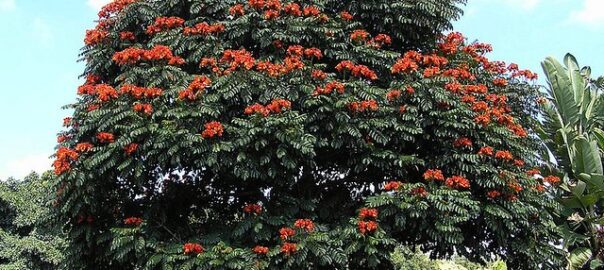I remember the day the town died. I was sitting under an African tulip tree, sucking on a papaya between bites of pinto beans when the first bus arrived.
That was shortly after our mountain started talking. The first day it puffed, I was horrified. I dropped my beans and ran to Papá. I was out in the field with my brothers. My little sister had wanted to come, but Mamá told her, “No, when you are big, like Aelina,” and I was proud.
“Papá, Papá, why is it breathing?” I asked.
Papá stopped and thought for a while. “It’s trying to tell us something,” he said. But he was wrong, it was testing us.
That evening, when the work was done, Mamá greeted us, like always, with a table full of food. Our potatoes came from Mamá’s cousins a few parcels over, and our meat came from Papá’s brother. We supplied the village with beans for coffee.
“Mamá, do you see it?” I asked. Night had fallen and the smoke bellowing from the mouth of the mountain was highlighted by the thin crescent light, high among the stars.
“I do, mi Aelina. My mamá told me El Roca would awaken one day.”
“How did she know?”
“Her mama told her because her mamá had seen it.”
“Why has it been sleeping?”
“No one knows mi niña.”
The initial explosion sent five village men to their death. Half of the town thought it was a sign from God, the other from the devil, refusing to explain the red, fiery ooze to their children. “It’s just the devil talking, beckoning our souls to its place,” they would say. Volcano people came to study it, to tell us whether we needed to flee. “You’re probably fine,” they concluded.
The straw roofs of the town still stopped the rain as they had for decades, and the tired door hinges kept moving, but when the lava started flowing, everything else shifted. Slowly, and then quickly, the people came for hundreds of miles from resorts that couldn’t have been farther from here. “What will it do tonight?” they would ask. “Where can we sleep? Where can we eat?”
For the first time in its history, the village imported vegetables and meats from its neighbors. Papá tore out half of our Coffea plants to make space for a shop. Big black buses would arrive, and the people — white and burnt with their phones and bags and water bottles and snacks wrapped in plastic — would pour out ready to learn about Arabic beans and the process we used. Papá didn’t tell them the real story.
He didn’t tell them that in the mornings he would awaken us with a tickle while he lovingly bellowed, “Despierta a mis hijos.” He didn’t tell them he slept soundly, alone on a cot, while my sisters and I slept with mama in a bed twice the size. “For warmth,” Mamá said. My brothers, my little monkeys like the ones that stole our hats if we weren’t careful, shared a mattress in the corner. The boys might sleep upside down or sideways, drooped over one another, or smooshed against the wall. It didn’t matter. Nothing stirred us but the sound of the cockadoodle doo when the sun came up or the voice of our father.
He didn’t tell them the way Mamá always combed my hair before I went out into the field. “Mamá,” I would say, “I’m just going to sweat through it.”
“Hush, darling. Nonsense. Let the sun shine on you.”
He didn’t tell them how to pass the time, we embellished tales of El Roca and giggled as we tricked the monkeys. And he didn’t tell them that there was nothing to worry about, because maybe he knew.
Even at its most active, the volcano’s warning level was never raised past a three. The locals feared nothing but hid their calm from the visitors. The fear of a sudden catastrophic eruption kept the stakes higher, and the visitors coming back.
“Could it ever reach your home?” they would ask Papá, under the shade of my African tulip.
“Why yes, absolutely, we live in fear but where would we go? Please, here is the shop. Help me support my family,” he would say in perfect English.
And these people would feel sorry for us. How could a man endanger his children like this, they must have thought, as they handed me dollars or colón across the counter.
And then one day, three years after Papá opened the shop, but as quickly as it had started, it stopped. No more smoke, no more lava. The volcano people said it was sleeping, that one day it might wake up again. But locals said the devil got what it needed.
Word spread. The visitors didn’t want to see a sleeping volcano. They wanted smoke and fire and hot lava oozing through the crevices of the earth. African tulips took their places, suffocating everything around them, stealing the water from our crops, and murdering the stingless bees that tried to suck from them.
 Hayley Nivelle is an emerging writer and a practicing attorney. She has a J.D. from the University of Pennsylvania School of Law and a M.S. from the Honor’s Program at Kansas State University. Hayley lives in Harrison, New York with her husband and two boys.
Hayley Nivelle is an emerging writer and a practicing attorney. She has a J.D. from the University of Pennsylvania School of Law and a M.S. from the Honor’s Program at Kansas State University. Hayley lives in Harrison, New York with her husband and two boys.
